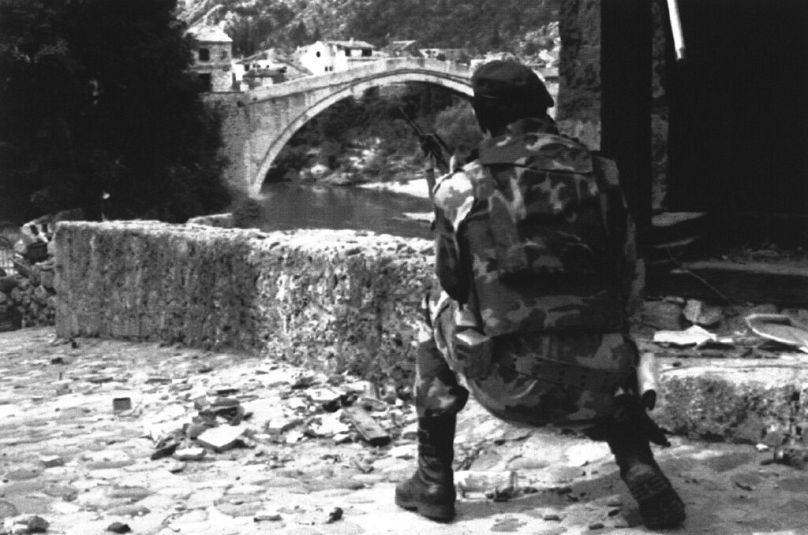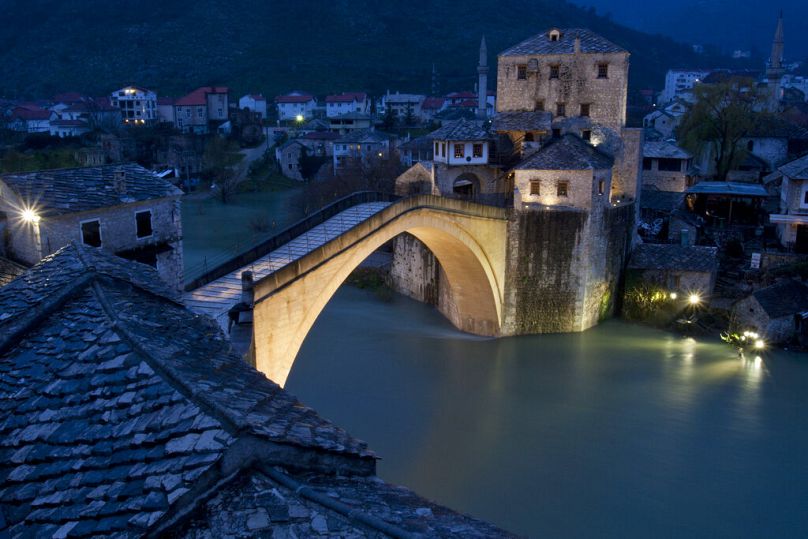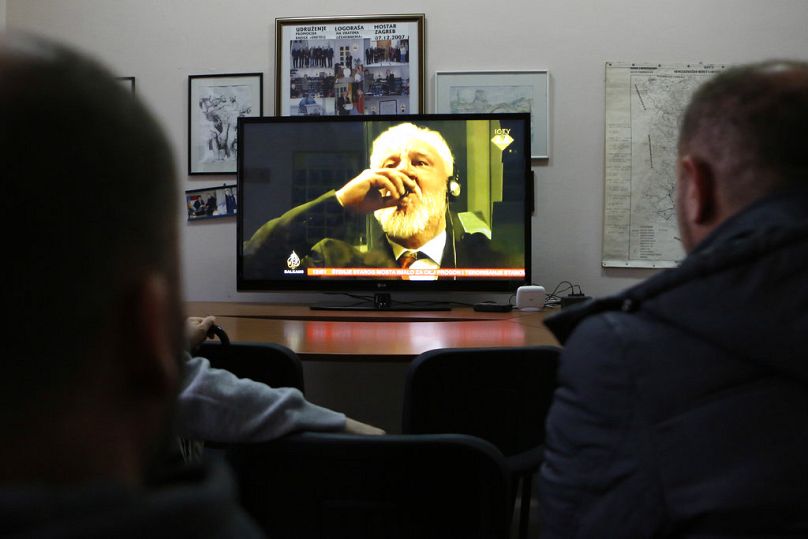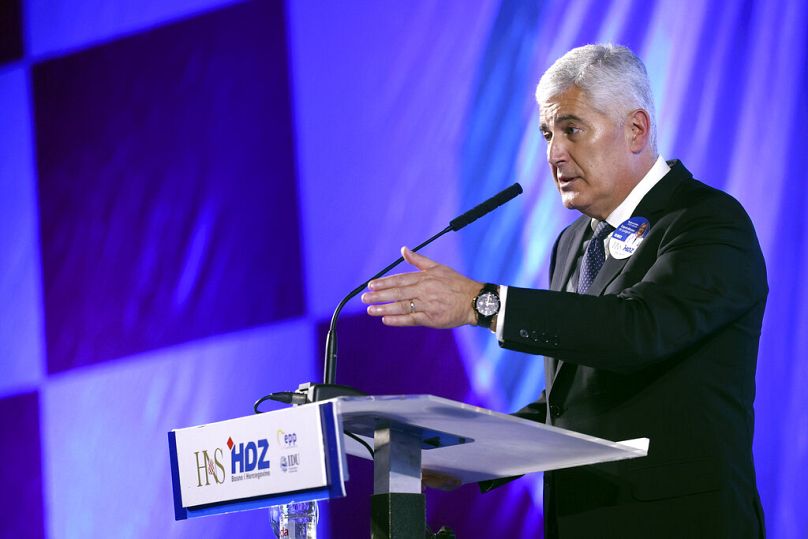
Survivors of one of the harshest concentration camps of the Bosnian War are furious that a museum will be built in its place.
Their anger is compounded by the fact that the museum will not commemorate their suffering, but rather honour the army that held them against their will, including torturing and killing detainees.
“Imagine if the German armed forces had their own museum in a former concentration camp? It’s disgusting,” Edin Batlak, the head of the association of former inmates, told Euronews.
During the siege of Mostar in 1993-1994, the Croatian Defence Council or HVO established the Heliodrom Camp. A former military aviation compound was turned into a prison facility and used by the HVO to detain locals who they deemed to be against their cause, but also as a means of spreading fear among the local population.

For the duration of the camp’s existence, about 10,000 people were detained there, mostly men, but also women and children. At least 54 people were killed or died of maltreatment.
“More than 90% of the people held there were civilians who were basically pulled out of their houses and apartments, in their pyjamas and barefoot in some cases, gathered at the stadium in the western part of Mostar and then taken to the Heliodrom,” Batlak explained.
During the 1992-1995 Bosnian War, one of the bloodiest conflicts in Europe since World War II, most of the fighting resulted from ethnic tensions between the Serbs, Croats and Bosniaks, the country’s three main ethnic groups.
It was especially hard on Mostar, one of the most culturally and architecturally diverse cities in pre-war Bosnia, which faced gruelling shelling during the conflict and lost many of its inhabitants.

Batlak told Euronews that he and other survivors were able to visit their former place of detention for the first time this year “and lay flowers in the memory of those who perished there.”
Why build a museum there?
In order, ostensibly, to prevent the country’s ethnic groups from once again being pitted against each other, the post-war political system in Bosnia is set up in a complex maze of ethnic checks and balances which ensure that all sides are happy at all times – or at least not at each other’s throats.
The internationally mediated peace in the country has resulted in many protections for all three sides, even when they want to stick to their own version of history. This is why the three wartime belligerents now get to choose a location, anywhere in the country, where they can open a museum dedicated to their respective armies.
However, not all three sides committed war crimes equally. The Bosniak victims in Mostar, often reduced to their nominal Muslim faith, by far outnumbered the other groups in terms of casualties.
In addition, the Bosnian Croat army in Mostar had the financial and tactical support of neighbouring Croatia, which openly supported the people they considered their brethren in the country.
“They want to glorify their war crimes and present them as a positive thing. They want to be rewarded for denying and minimising war crimes,” Batlak exclaimed.
A political legacy shrouded in war crimes
While Bosnia tried to maintain its post-war order, those who committed crimes during the fighting were prosecuted at the Hague according to the highest international legal standards. In fact, Bosnia’s experience will likely serve as a useful guide for prosecuting war crimes committed during Russia’s ongoing invasion of Ukraine.
The case of Prlić et al prosecuted war crimes committed in southwestern Bosnia, including those at the Heliodrom Camp – although the case is more famous because one of the defendants, Slobodan Praljak, sneaked cyanide into the courtroom and ingested it during his sentencing in 2017.

The ICTY confirmed that the HVO participated in the unlawful detainment, torture and killing of prisoners of war, in Mostar and elsewhere – as alleged by Batlak and other survivors.
Today in Mostar, the political descendants of the Croatian forces are now grouped around the Croatian Democratic Union party, or HDZ, which is the strongest influence on local politics.
In fact, the current leader of the party, Dragan Čović, has been implicated in the abuse of the Heliodrom Camp detainees.
“The very fact that Čović participated in forced labour and basically brought the camp detainees to work at his company says a lot about what the party gets away with,” explains Amer Bahtijar, a journalist at the independent Tačno news outlet from Mostar.
The HDZ leader has not been charged with the crimes committed at the Heliodrom. Many believe that, if he were charged, he would depict himself as a Bosnian version of Oscar Schindler – the German industrialist who saved Jewish lives by employing them in his company.
Čović has successfully managed to present the forced labour of the detainees as something that was not illegal at the time, despite the fact that forcing those stripped of their freedoms to participate in labour is against the Geneva Conventions.
He claimed in interviews that “nobody worked for money at the time” and denies wrongdoing.

Yet several regional outlets have covered the testimonies of other survivors and even published documents in which Čović asks for Heliodrom detainees to be sent to work for his company.
For his role as a perceived peacemaker, Čović has been at the helm of Bosnian politics for decades, and is viewed as a reliable interlocutor for the international mediators involved in the country.
“This man is someone who the EU sees as a partner, instead of prosecuting and charging him with these crimes,” Bahtijar told Euronews.
Bahtijar is part of a group of independent and progressive voices in Mostar who insist that local Croats should resist being co-opted by HDZ in Bosnia and try to pave their own path, especially one that is not riddled with war-crime denialism.
“HDZ does not have a true opposition in terms of a Croat party that would oppose their domination. There aren’t enough media outlets that criticise them in the Mostar area either, and those who have vocally opposed their policies have literally been beaten up,” said Bahtijar.
“So they propagate an intense media censorship,” he concluded.





